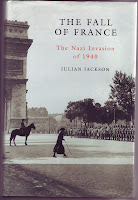
Since starting this blog this is the first non-fiction title I have read and a return to the sort of reading I was consuming a couple of years ago. History books these days have to be narrative as well an analytical, something Julian Jackson acknowledges here splitting the first book into that type of history. The second part is briefer and harder to follow and reminds you of the old-fashioned history texts that sent you to sleep while trying to be informative.
Contents summary
The book aims to simply explain why it was that the Nazi army could set out to capture France via Holland and Belgium and manage to do all of that in a matter of weeks. There are several reasons put forward:
Bad preparation
Low morale
Poor intelligence
These were against a political background of few allies and general upheaval with various parties vying for government. When it really mattered there was a split over whether or not the French should stand or sign an armistice and those arguments cost a prime minister his position. Ultimately the German’s were just too quick, better able to use their military hardware and did not attack where they were meant to making the French efforts always going to be second best.
After the war what was interesting is how little the conflict was talked about and how few French historians studied it. But despite that the impact made certain people behave in the way that they did – namely de Gaulle who set out to have a strong sense of French national identity. There are comparisons made between the French army of 1914 and the British relationship and their morale. In the first the only major difference was the French managed to gain a victory, the Marne, that had a massive psychological impact that helped them steady the nerves. When it comes to comparisons with the British they were also neither in a better shape militarily or politically with Churchill not universally admired.
It is well written?
A difficult one here because it does rumble through the events but there is never a real sense of what is happening and then with France having lost the war the narrative cuts off although the political and historical analysis of it carries the story on after the fall of Nazi Germany, leaving you with a vacuum of about five crucial years. The narrative moves forward and backwards a bit like a jelly with you trying to get across the story but each time the narrative seems to move you on it then pulls you back to make a further point about the characters, politics or military strategy of the time. Not the most difficult read but one that could have been made more enjoyable.
Should it be read?
There are not too many books dedicated to looking at why the French collapsed in the way that they did and so this is worth reading from the point of view that there are not going to be too many other places to go to get this sort of information. But it is going to leave you with some gaps that have the potential to annoy. The reason for coming to this book was that having read Iron in the Soul by Jean-Paul Sartre it felt like a good idea to put some more meat on the bones and try to get to the facts of why his lead character Mathieu ended up in the situation he did facing the Germans in a village during a retreat. This partly answers those questions and so for those with a similar desire this is a good option to plum for.
Summary
Facing the blitzkrieg of an army with its confidence high the French never managed to recover from low morale, bad intelligence and divided politics
Version read – Oxford University Press hardback







